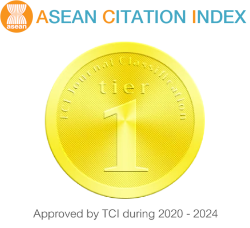Work-Related Factors and Mental Health Outcomes among Healthcare Workers during COVID-19 Pandemic
Keywords:
mental health, COVID-19, pandemics, health personnel, work-related factorsAbstract
This cross-sectional research focused on studying the prevalence of mental health outcomes and preventive behaviors, and to examine work-related factors associated with mental health outcomes during the COVID-19 pandemic amongst the healthcare workers employed by the Ministry of Public Health Thailand. The data were collected by the online questionnaire from 12 health regions, 417 healthcare workers administered during the first wave (May 1-15, 2020). The Depression Anxiety and Stress Scale - 21 Items (DASS-21) Thai version was used to assess mental health outcomes. The Chi-square test was used to examine association between depression, anxiety and stress-related factors. The results found that 2.4%, 7.2%, and 3.9% of all respondents demonstrated severe to extremely severe depression, anxiety, and stress; while practices of preventive behaviors were as high as 82.0% of wearing masks and 76% of practicing hand-hygiene. The associated factors of mental health outcomes were: (i) working with COVID-19 inpatients; (ii) organizational management to ensure low infection risk; (iii) inadequate of personal protective equipment (PPE); (iv) work with the fear of contracting infection; (v) the non-adherence behavior of patients towards safety protocols. The study recommends that effective management practices towards reducing infection was predominant associating and modifiable factor of mental health outcome. In particular, this should be applied to the healthcare workers coming in direct contact with patients in the “new-emerging phase” or a “repeated wave” of COVID-19 outbreaks.
References
World Health Organization. Coronavirus disease (COVID-19) outbreak: coronavirus disease (COVID-19) pandemic [Internet]. 2020 [cited 2020 Oct 17]. Available from: https://www.euro.who.int/en/health-topics/health-emergencies/coronavirus-covid-19/novel-coronavirus-2019-ncov.
Blumenthal D, Fowler EJ, Abrams M, Collins SR. Covid-19 — implications for the health care system. N Engl J Med. 2020;383(15):1483–8.
Gai R, Tobe M. Managing healthcare delivery system to fight the COVID-19 epidemic: experience in Japan. Glob Health Res Policy. 2020;5(1):23.
Centers for Disease Control and Prevention. Healthcare facilities: managing operations during the COVID-19 pandemic [Internet]. 2020 [cited 2020 Oct 17]. Available from: https://www.cdc.gov/coronavirus/2019-ncov/hcp/guidance-hcf.html.
Han E, Tan MMJ, Turk E, Sridhar D, Leung GM, Shibuya K, et al. Lessons learnt from easing COVID-19 restrictions: an analysis of countries and regions in Asia Pacific and Europe. Lancet. 2020;396(10261):1525-34.
Krist AH, DeVoe JE, Cheng A, Ehrlich T, Jones SM. Redesigning primary care to address the covid-19 pandemic in the midst of the pandemic. Ann Fam Med. 2020;18(4):349–54.
Lai J, Ma S, Wang Y, Cai Z, Hu J, Wei N, et al. Factors associated with mental health outcomes among health care workers exposed to coronavirus disease 2019. JAMA Netw. Open. 2020;3(3):e203976.
Nguyen LH, Drew DA, Graham MS, Joshi AD, Guo C-G, Ma W, et al. Risk of COVID-19 among front-line health-care workers and the general community: a prospective cohort study. Lancet Public Health. 2020;5(9):e475-83.
Pappa S, Ntella V, Giannakas T, Giannakoulis VG, Papoutsi E, Katsaounou P. Prevalence of depression, anxiety, and insomnia among healthcare workers during the COVID-19 pandemic: a systematic review and meta-analysis. Brain Behav Immun. 2020;88:901-7.
da Silva FCT, Neto MLR. Psychological effects caused by the COVID-19 pandemic in health professionals: a systematic review with meta-analysis. Prog Neuropsychopharmacol Biol Psychiatry. 2021;104:110062.
Muller AE, Hafstad EV, Himmels JPW, Smedslund G, Flottorp S, Stensland SØ, et al. The mental health impact of the covid-19 pandemic on healthcare workers, and interventions to help them: a rapid systematic review. Psychiatry Res. 2020;293:113441.
Spoorthy MS, Pratapa SK, Mahant S. Mental health problems faced by healthcare workers due to the COVID-19 pandemic–a review. Asian J Psychiatr. 2020;51:102119.
Wayne W. D. Biostatistics: a foundation of analysis in the health sciences. 6th ed. John Wiley&Sons; 1995.
Ngamjarus C, Chongsuvivatwong V. n4Studies: sample size calculation for an epidemiological study on a smart device. Siriraj Med J. 2016;68(3):160-70.
Strategy and Planning Division, Ministry of Public Health. Report health resource [Internet]. 2018 [cited 2020 Apr 1]. Available from: http://bps.moph.go.th/new_bps/sites/default/files/Report%20Health%20Resource%202018.pdf.
Thongkaeo T, Suppapitiporn S. Stress in workplace and its related factors among registered nurse at outpatient department of a hospital in Bangkok. Chula Med J. 2018;62(2):197-209. (in Thai)
Oei TPS, Sawang S, Goh YW, Mukhtar F. Using the depression anxiety stress scale 21 (DASS-21) across cultures. Int J Psychol. 2013;48(6):1018-29.
Giorgi G, Lecca LI, Alessio F, Finstad GL, Bondanini G, Lulli LG, et al. COVID-19-related mental health effects in the workplace: a narrative review. Int J Environ Res Public Health. 2020;17(21):7857.
Tantrakarnapa K, Bhopdhornangkul B, Nakhaapakorn K. Influencing factors of COVID-19 spreading: a case study of Thailand. Z Gesundh Wiss. 2020;1-7.
Evanoff BA, Strickland JR, Dale AM, Hayibor L, Page E, Duncan JG, et al. Work-related and personal factors associated with mental well-being during the covid-19 response: survey of health care and other workers. J Med Internet Res. 2020;22(8):e21366.
Thitaree K, Chaiwong W. A study on prevalence of work-related stress and relating factors among staff in a private hospital. TMJ. 2019;19(1):115-32. (in Thai)
Karasek RA. Job demands, job decision latitude, and mental strain: implications for job redesign. Adm Sci Q. 1979;24(2):285–308.
Simms A, Fear NT, Greenberg N. The impact of having inadequate safety equipment on mental health. Occup Med. 2020;70(4):278-81.
Karasek R. Demand/Control model: a social, emotional, and physiological approach to stress risk and active behaviour development. In: Encyclopaedia of occupational health and safety. Geneva: International Labour Organization; 1998. p. 34.6-34.14.
Downloads
Published
How to Cite
Issue
Section
License

This work is licensed under a Creative Commons Attribution-NonCommercial-NoDerivatives 4.0 International License.
Journal of Health Systems Research is licensed under a Creative Commons Attribution-NonCommercial-NoDerivatives 4.0 International (CC BY-NC-ND 4.0) license, unless otherwise stated.




